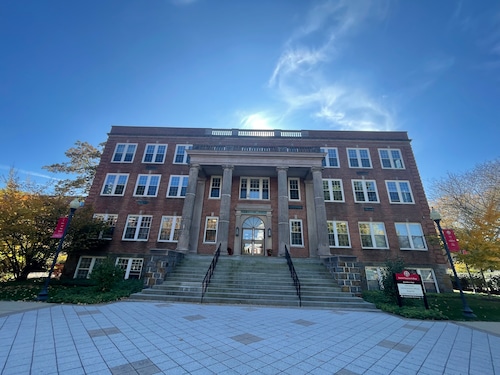Graham Crain had never been away from his home in Hamilton, Ohio, before being recruited to play baseball at Eastern Nazarene College in Quincy. The college quickly became a place of attachment and growth for Crain.
But in June 2024, Crain and other members of the Eastern Nazarene community received disturbing news: the college announced it would be closing its doors in May 2025 because of financial woes.
As the college community and Quincy residents mourned a staple of their city, Crain — now a developer — saw a vision for it.
“I thought, hey, maybe there’s an opportunity here to create some value, but also keep the heritage and legacy of campus,” Crain told MassLive.
Within weeks, Crain was beginning conversations with the college and the city and confirmed the sale in Fall 2024.
What are his plans for the campus?
Most of the Eastern Nazarene College campus is expected to become housing — a mix of new multi-family, town home and senior-living residential developments.
The front lawn, library and Gardner Hall, the administrative building, will likely remain intact and may be repurposed for other uses like office space, nonprofits or a preschool, Crain said.
He is also keeping Campus Kinder Haus, which will continue as an independent preschool.
“I remember the first time being on campus, you pull up to the front gate, the front lawn, the main marble staircase and pillars to the Gardner Hall, the church and then beautiful trees. It’s an arboretum already,” he said.
Ultimately, a lot of the plans for development are in flux and contingent on environmental and building inspections. As such, the exact kind of housing that will be built, quantity and construction start date are still being determined, according to Crain.
Gardner Hall at Eastern Nazarene College.Juliet Schulman-Hall
Crain expects certain buildings to be demolished.
“I am not oblivious to the fact that being an alum buying it, everyone’s going to be very, very happy about that and there is going to be at least I have an understanding of campus and the meaning of it and what the legacy and heritage of it is,” he said.
“But the moment I remove, demolish, change what it used to be, then I will once again not be beloved,” he said.
Crain is having to weigh being a good neighbor with making money and adding value to the neighborhood, he said.
However, he understands the importance of keeping the essence of the college intact with its greenery and older buildings so that neighbors and alumni can still enjoy walks through the trees.
He doesn’t want to create a “sterile new apartment complex.”
Neighbors have voiced their concerns about turning the college campus into residential housing, primarily focused on the potential environmental impacts of building on open land with flooding issues, concerns about parking and traffic congestion and changing the integrity of a dense single-family neighborhood.
Crain said he is aware of these concerns and will make sure that there is enough parking to help alleviate traffic concerns and abide by the environmental standards set by the city, Crain said.
“We’ll come in with those residential, that residential feel, and so we’ll stick with that community feel for the neighbors. I remember when I was a student, you could barely get a car through the streets. This won’t create traffic that the college campus did … we’re going to probably slow traffic down,” Crain said.
Moving forward
Selling a college campus doesn’t always happen quickly. Campuses can sit vacant for years without potential buyers, and even if they are bought, it can be an uphill battle depending on zoning and community pushback.
What has sped up the sale of Eastern Nazarene College, in some ways, is its location.
The campus is situated in an attractive location, close to Quincy’s downtown and in proximity to the MBTA’s Red Line, baked into surrounding residential neighborhoods.
Ever since Crain was announced as the new owner of the campus, he said he has had two serious inquiries from colleges to buy the entirety of their campus and another inquiry to buy part of the campus.
Crain declined to tell MassLive what the names of the institutions are or whether they are in New England due to non-disclosure agreements.
However, he said closing colleges are important opportunities for developers.
“I hope that I can — our team can — do a good job where an alum still comes back and sees the front gate, sees the front lawn, sees Gardener, the library, the trees, the church and goes, ‘Man, this still feels like ENC,’” Crain said.
More higher ed
Read the original article on MassLive.
Read the original article on MassLive.
Read the full article here


